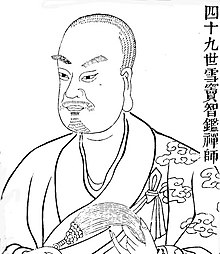 | |
| Title | Chán master |
| Personal | |
| Born | 1105 Chuzhou,
China |
| Died | 1192 |
| Religion | Buddhism |
| Denomination | Chán/ Zen |
| School | Caodong/ Sōtō |
| Senior posting | |
| Teacher | Tiantong Zongjue |
| Predecessor | Tiantong Zongjue |
| Successor | Tiantong Rujing |
Students | |
Xuedou Zhijian ( simplified Chinese: 雪窦智鑑; traditional Chinese: 雪竇智鑑; pinyin: Xuědòu Zhìjiàn; Japanese: Setchō Chikan), was a Chinese Zen Buddhist monk during the Song Dynasty. He was born in an ancient town called Chuzhou in what is now Anhui Province. The details of his life have not survived in great detail. In 1154, he is known to have become the abbot of Xizhen Temple near modern Hangzhou. He moved again in 1184 to Mount Xuedou, where he was said to have many students. In the years leading up to his death in 1192, he apparently lived in seclusion in a cottage to the east of his temple. [1] According to the Conglin shengshi (Glorious matters from the monasteries), written in 1199 by Guyue Daorong, Zhijian wrote a popular verse that poked fun at the renowned teacher Hongzhi Zhengjue. The verse is: “Obtaining one Zong, losing one Chong; Joining his palms in front, beating his chest in back.” "Zong" refers to a well-known student of Hongzhi named Sizong, while "Puchong" is a reference to Yetang Puchong, a student who studied under Hongzhi, but later left to study under Caotang Shanqing, a teacher of the rival Rinzai/ Linji school. [2]
References
- ^ Ferguson, Andrew E. (2000), Zen's Chinese heritage: the masters and their teachings, Wisdom Publications, p. 450, ISBN 978-0-86171-163-5
- ^ Schlütter, Morten (2010), How Zen Became Zen: The Dispute Over Enlightenment and the Formation of Chan Buddhism in Song-Dynasty China, University of Hawaii Press, p. 69, ISBN 978-0-8248-3508-8